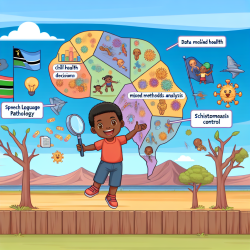Introduction
In the field of speech-language pathology, the use of data-driven decisions is paramount to achieving successful outcomes, particularly when it comes to pediatric populations. However, the principles of evidence-based practice are universal and can be applied across various disciplines, including medical research. The study titled "Safety of Ertugliflozin in Patients with Type 2 Diabetes Mellitus: Pooled Analysis of Seven Phase 3 Randomized Controlled Trials" provides a comprehensive safety analysis of the SGLT2 inhibitor, ertugliflozin, which is approved for treating adults with type 2 diabetes mellitus (T2DM). This blog aims to translate the findings of this research into actionable insights for practitioners, encouraging them to enhance their skills and understanding of evidence-based approaches.
Understanding the Research
The study conducted a pooled analysis of seven phase 3 randomized controlled trials, focusing on the safety profile of ertugliflozin. The trials included over 4,800 participants, assessing the effects of ertugliflozin 5 mg and 15 mg doses compared to placebo or an active comparator. The results indicated that ertugliflozin was generally well-tolerated, with no significant increase in adverse events (AEs) such as urinary tract infections, fractures, or hypoglycemia. However, it was associated with some AEs like genital mycotic infections and osmotic diuresis-related symptoms such as thirst and increased urination.
Key Findings and Implications for Practice
For practitioners, the implications of these findings are multifaceted:
- Risk Assessment: Understanding the specific AEs associated with ertugliflozin allows practitioners to better assess the risk-benefit ratio for individual patients, particularly those with renal impairment or older adults.
- Patient Education: Educating patients about potential side effects, such as increased urination and genital infections, can enhance adherence to treatment plans and improve patient outcomes.
- Monitoring and Follow-Up: Regular monitoring of renal function and hydration status in patients taking ertugliflozin can mitigate the risk of volume depletion and ensure timely intervention if AEs occur.
Encouraging Further Research
While the study provides valuable insights, it also highlights the need for ongoing research to explore long-term safety outcomes and potential benefits of ertugliflozin beyond glycemic control. Practitioners are encouraged to stay informed about emerging research and consider participating in clinical trials or collaborative studies to contribute to the growing body of evidence.
Conclusion
In conclusion, the safety analysis of ertugliflozin offers critical insights for practitioners aiming to enhance their practice through data-driven decisions. By integrating these findings into their clinical approach, practitioners can improve patient education, monitoring, and overall treatment outcomes. To read the original research paper, please follow this link: Safety of Ertugliflozin in Patients with Type 2 Diabetes Mellitus: Pooled Analysis of Seven Phase 3 Randomized Controlled Trials.










